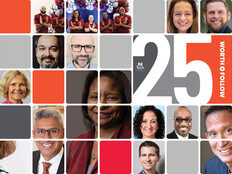Voices: What Do IT Workers Have to Say About BYOD?
Microsoft's Cameron Evans raises an intriguing question about BYOD policies: Why would parents — most of whom are footing the bill for their children's personal smartphones, notebooks and tablets — let college IT staffs put anything on students' personal devices?
"There is a human threshold on how much friction people want to experience on a personally owned device," notes Evans, national technology officer for Microsoft Education, in a recent post to his blog, Higher Innovation. "I would argue that the threshold is significantly lower on personally owned devices than on a device owned and managed by the institution."
Sasan Poureetezadi, vice president of IT at Mesa Community College in Mesa, Ariz., says that although the potential for friction exists, he handles that issue by focusing on role-based access. "If you're a guest and we don't know who you are, we just give you the web," he says. "But if we know and trust you, the student is given more access."
You can read Evans' blog post, "BYOD Versus Academic Equity," here; and check out Evans and other bloggers on "The Dean's List: 50 Must-Read Higher Education Technology Blogs."
Voices

"We serve a large student population, over 90,000; therefore, our strategy is to let the students bring whatever device they want, and we only provide Internet network access supported by a centralized intrusion prevention system and threat protection services."
— Tim Ryan, Technical Operations Manager, City College of San Francisco

"By upgrading our wireless network, it put us on a path to do BYOD and also gave us the ability to support mobile applications and tablet pilots for educational purposes."
— Susan McHugh, Executive Director for IT Services, Mount Wachusett Community College, Gardner, Mass.

"We give people the choice of bringing their own device or using a university-issued one. We've experienced high levels of interest in the program, and own-device users have a high degree of satisfaction, which we anticipate will also positively affect creativity and productivity. People really like the freedom of choice."
— Carol Kondrach, Associate Vice President for IT, Rider University, Lawrenceville, N.J.







